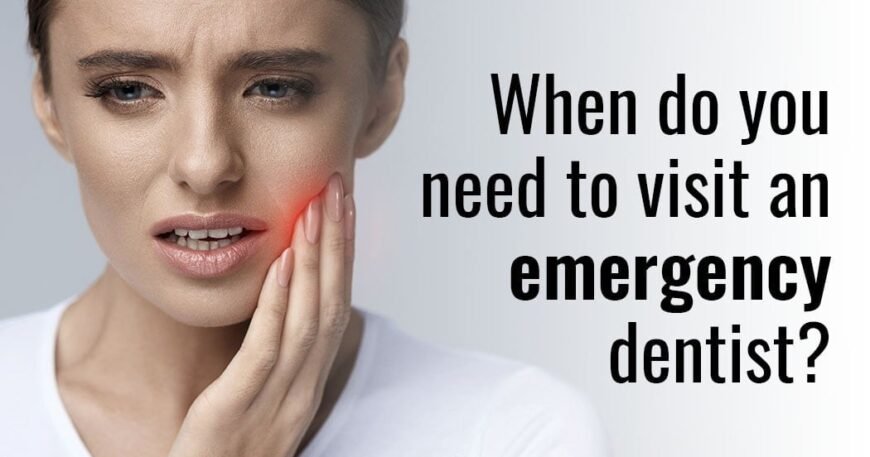Dental emergencies can lead to pain, swelling, discomfort, or even more significant problems down the road. However, you may wonder what a dental emergency is and what signs show you need to see a dentist for an emergency dental service.
Understanding the difference between a dental issue that can be put off until your next dental appointment and an emergency issue that can threaten your health is important. This post discusses what you should know about dental emergencies and how to recognize a dental problem that needs immediate attention.
What is a dental emergency?
A dental emergency is any dental problem that needs immediate treatment to alleviate severe pain, stop bleeding, or save a tooth. This also applies to dental infections (like septicemia) that can be life-threatening.
Common dental emergencies and signs you need emergency dental care
Dental emergencies are often characterized by pain and bleeding. However, not all toothaches or dental problems are considered an emergency. To determine if you need an emergency dental service or if you can wait until your next dental office visit, check for the following dental issues or signs.
-
- You have a loose or knocked-out tooth
You need to see your dentist immediately if your teeth are loose, wiggly, or have been knocked out of your mouth. A loose or knocked-out tooth can indicate a localized infection (such as dental caries or gum disease) or a tooth injury (usually caused by a heavy impact from falling, a sports injury, or a car accident). By taking quick action, your dentist can reinsert your tooth and preserve it or identify the root cause and provide treatment.
If you have a knocked-out tooth, do the following before seeing your dentist:
-
-
- Pick the tooth up carefully without touching its root
- Rinse it (do not scrub it)
- If possible, reinsert it into its socket
- If you cannot reinsert it, place it in a container of water or milk
- Visit your dentist as fast as you can to increase the chances of saving your natural tooth
- You have a severe toothache
-
Tooth pain and discomfort are not something you should ignore. They’re your body’s way of expressing an issue in your mouth that needs to be checked. If you experience unexplainable or sudden tooth pain, or the pain’s severity has increased, visit your dentist for proper diagnosis and treatment.
-
- Your gums ache, become swollen, or bleed
Problems like occasional gum irritation are not considered a dental emergency. However, gums with excessive or recurring bleeding can indicate an underlying health or dental issue, especially if accompanied by swelling and pain. These symptoms (especially if caused by gum disease) can reach the point of no return if left untreated.
-
- Your mouth or jaw is swollen
If your jaw or mouth suddenly becomes swollen for no obvious reason, then it’s time to visit your dentist for immediate treatment. These symptoms can indicate a serious infection, lymph node irritation, or an underlying issue a professional dental care provider needs to address immediately.
-
- You notice signs of an abscessed tooth
An abscessed tooth is a painful, severe, and potentially life-threatening infection usually found at the root of the infected tooth. It is typically caused by severe gum disease, untreated cavities, or any trauma to the teeth, like a chipped or cracked tooth. Symptoms of a dental abscess include:
-
-
- Fever
- Foul taste in the mouth
- Tooth sensitivity
- Persistent toothache
- Pimple-like bumps on your gums
- Swollen face
- Tender lymph nodes in your neck
-
An abscessed tooth is a dental emergency because the infection can spread beyond the mouth and cause issues in other areas of the body.
-
- Your dental filling is missing (or your mouth tastes like metal)
If you’ve had a metal filling in the past and your mouth suddenly starts tasting like metal, your old filling might be loose or cracked. A missing filling is a potential dental emergency, as your tooth can break easily due to the lack of reinforcement provided by the dental filling. Your tooth’s nerves may even be exposed, leading to several other dental problems requiring immediate care.
-
- An object/food is lodged between your teeth
You should see your dentist immediately if an object or piece of food becomes lodged between your teeth, and flossing or brushing cannot remove it. Failure to remove the object can lead to tooth decay, gum disease, gum irritation, crooked teeth (as it can shift your teeth), or an infection.
-
- Your dental crown breaks or falls off
You must immediately see your dentist if your dental crown breaks or completely falls off. This is because your tooth will be exposed and susceptible to infection and damage. An emergency dental visit to replace your dental crown can help you avoid the need for an extraction, root canal, or other dental procedure to preserve your oral health.




